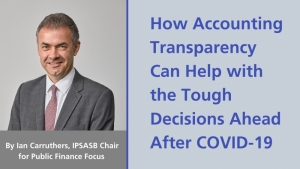عرض العناصر حسب علامة : المحاسبة الحكومية
الأربعاء, 21 سبتمبر 2022 13:07
نصائح واتجاهات التوظيف لعام 2021
من التوسع المفاجئ في العمل عن بُعد إلى طلبات خدمة العملاء الجديدة، كان لوباء COVID-19 آثار كبيرة على كيفية قيام شركات المحاسبة بأعمالها
معلومات إضافية
-
المحتوى بالإنجليزية
The Future of Finance: Hiring Tips And Trends For 2021
From the sudden expansion in remote working to new client service requests, the COVID-19 pandemic has had significant effects on how CPA firms do business. And while many disruptions might be behind us, the aftershocks will rumble on for some time.
Paul McDonald
Pandemic-driven changes creating benefits
As leaders scrambled to put new processes in place to navigate the effects of COVID-19 on the business, they have made progress in a number of areas. In a survey of senior managers:
41% say leadership communication is better now than it was pre-pandemic
37% think collaboration has improved
31% feel like there’s been substantial innovation over the past few months
Perhaps the most positive development is the way some companies have reimagined the hiring process. Of companies asked about their hiring methods in the age of social distancing:
57% are conducting interviews and onboarding remotely
40% have shortened the end-to-end hiring process
38% have advertised fully remote positions
These changes can help you act quickly and decisively when you’ve identified the right candidate for a position. And the prevalence of remote working means you can look further afield for skilled staff, giving your company access to a deeper pool of talent.
Accounting staff are in demand
One aspect hasn’t changed: It’s still a competitive hiring market for financial talent. You’ll have to fight hard for the best performers because many companies are ramping up recruitment. For example:
● Public accountants are a lifeline for small and midsize businesses right now. They’re helping clients navigate unpredictable cashflows, as well as shifting compliance requirements.
● Corporate accountants are tasked with finding new efficiencies that will keep businesses viable during financial turbulence.
● Government accounting departments have been forced to scale up quickly to address a raft of unprecedented financial aid packages.
● Financial services institutions are helping clients secure credit and reorganize liabilities during tough times.
● Healthcare companies need staff to deal with billing, reconciliations and new payment processes.
Retention still a concern
Skilled professionals are making career moves, even during a pandemic, and retention remains paramount. Unemployment is higher, but not that high for those with specialized skill sets, so in-demand accountants could be tempted to join another company. For businesses with currently lean staff levels, even the loss of a single skilled professional could be a serious blow.
In a separate Robert Half survey highlighted in the 2021 Salary Guide, more than eight in 10 managers said they are worried about losing valued employees. Here are their primary concerns:
· 55% are worried about losing staff over morale-related issues
· 50% have employees who are facing burnout from heavy workloads
· 37% imposed salary cuts with no prospect of raises in the immediate future
Salaries remain stable
Median salaries are fairly stable across the board, though (as ever) the best candidates in the hottest sectors will be looking to negotiate a bump in pay. Use the Robert Half salary calculator to ensure you’re paying at least market value for your region.
Remote work is the new normal
The pandemic sparked a mass exodus from corporate to home offices. This was jarring for many workers, but research in the guide suggests that few employees are in a hurry to get back to company HQ. Almost three in four workers say they want to keep working from home after the pandemic.
When hiring, you’ll need to balance the desire of highly skilled candidates to work from home with the needs of the organization. Fortunately, you’ll be in a much better position to make these calls than you were in late March, since your firm should now have more data and anecdotal evidence to draw on regarding the productivity and morale of remote workers across your teams.
Tech skills are essential …
If you’re looking to add to your remote teams, new recruits should be tech savvy and capable of learning new systems with little or no in-person training. They need to be able to work with cloud-based systems, understand IT security protocols and be comfortable using digital communication tools. Home-based workers also need to have the basic IT skills to solve common computer and networking issues, as they won’t have hands-on support from a helpdesk technician.
However, while it’s easy to be dazzled by the new and exciting world of remote working, keep in mind that collaborative platforms like Slack and Microsoft Teams are much easier to master than specialized accounting software. Microsoft Excel, QuickBooks (for smaller businesses), enterprise resource planning (ERP) systems and similar applications remain the gold standards, and you should assess candidates’ resumes accordingly.
… but so are soft skills
When is an Excel wizard with a fully equipped home office wrong for your organization? Perhaps when their track record or interview performance suggest that they struggle to collaborate with colleagues, or that they find it difficult to adapt to changing goals and circumstances. In these challenging times, soft skills such as critical thinking, resilience and flexibility can be every bit as important as technical expertise.
The need for these attributes is not driven just by the pandemic. As new technology such as AI becomes an integral part of finance jobs, you’ll place a greater emphasis on the kind of human values that can’t be replaced by an algorithm.
Flexible staffing is the future
Flexible staffing — an adjustable mix of full-time and interim professionals — is a strategy many companies have long been using to temporarily access specialized expertise and scale their teams as needed without overburdening full-time staff. It is tailor made for the current situation. Asked why they worked with interim professionals, more than a third of senior managers said it was to remain agile during the economic turmoil.
Predicting the future has never been harder. But if 2020 has taught us anything, it’s that uncertain times reward companies that are nimble and innovative.
نشر في
موضوعات متنوعة
الأربعاء, 10 فبراير 2021 14:36
المحاسبة الحكومية عند مفترق طرق: الفرص الناشئة خلال COVID-19
معلومات إضافية
-
المحتوى بالإنجليزية
Government accounting at crossroads: Emerging opportunities during COVID-19
ED OLOWO-OKERE|FEBRUARY 05, 2021
Government accounting and financial reporting are at a crossroads today. Providing information on how much cash is received into treasuries and paid out for goods, services and transfers is not enough. Stakeholders are demanding more accountability and engagement in public finances. Governments are spending large sums of money to tackle the health emergency and to implement massive fiscal stimulus programs in response to the pandemic. Undoubtedly, timely and quality information is necessary to better assess the financial health of governments and to communicate the financial consequences of the pandemic to all stakeholders. This can contribute to building the much-needed trust in governments and improve the effectiveness of their pandemic response.
The World Bank’s recent paper on the role of Government Financial Reporting in times of the COVID-19 Pandemic provides guidance to accountants and auditors on identifying opportunities to improve financial reporting within the existing systems. The paper also highlights the impact of the pandemic on government financial performance, position and cash flows.
Similarly, the International Public Sector Accounting Standards (IPSAS) Board and International Federation of Accountants (IFAC) released a COVID-19 Intervention Assessment Tool, which helps assess, evaluate and inform various types of interventions by governments. Another recent study by the Association of Chartered Certified Accountants (ACCA) on Sustainable Public Finances through COVID-19 highlighted the critical need to record and manage the assets and liabilities being created through the below-the-line policy measures, such as guarantees and equity injections.
Some of the emerging lessons on government financial reporting during the COVID-19 crisis include the following:
Financial statements information has been traditionally underutilized by governments. Going forward, balance sheet information can inform how to achieve an inclusive and sustainable recovery in the post COVID-19 world.
Government accountants should more proactively demonstrate the value of financial statement information and why it should be analyzed in conjunction with statistical information.
While ‘accrual basis accounting’ is necessary to prepare financial statements that provide a comprehensive overview of the impact of COVID-19, jurisdictions following ‘cash basis accounting’ can enrich their financial statements with supplementary information for better decision making.
Comprehensive financial statements based on accrual-based accounting will contribute to debt transparency and improved decision making. For example, in the current situation where global public debt is projected to approach a record high in 2021, countries need to closely monitor their sources of funding and associated costs. Comprehensive financial statement information on debt is especially useful for making policy decisions.
Annual and interim financial statements should be prepared on a timely basis in order for them to be useful to policy makers and help inform pandemic-related response financial decisions.
Countries need to accelerate implementation of accrual-based accounting and financial reporting reforms, preferably aligned with the International Public Sector Accounting Standards (IPSAS) , to have more comprehensive and reliable financial information for decision making.
Ministries of Finance need to ensure that the necessary systems and procedures, including Integrated Financial Management Information Systems (IFMIS) implementation, are in place to facilitate the recording of transactions and preparation of financial statements. These include consolidated ones with different levels of aggregation and even the whole-of-government financial statements where feasible
Financial statements that include information on the long-term fiscal sustainability, with a focus on the impact of the pandemic, are necessary.
Strong coordination by the Ministry of Finance and Accounting Agencies with the auditors of government financial statements, i.e. Supreme Audit Institutions (SAIs), is critical. This is not only with respect to the preparation of audited financial statements but also in developing and implementing accounting and financial reforms such as migration to accrual-based accounting.
Accounting and auditing agencies should regularly conduct business continuity assessments so that governments are ready to face future emergencies without detrimental effects on their operating capacity , and that essential and non-essential staff can work remotely when needed.
The COVID-19 pandemic has changed the world and how governments operate forever. By strengthening public financial management systems and protocols today, governments will be better prepared for an increasingly uncertain tomorrow.
نشر في
موضوعات متنوعة
الأحد, 23 أغسطس 2020 12:53
دراسة ماجستير: أثر تفعيل مدخل مراجعة الأداء على كفاءة مراقبي الحسابات بالجهاز المركزي للمحاسبات في كشف والتقرير عن الفساد المالي في الوحدات الحكومية
تعد الأموال العامة الأداة التي بواسطتها تمارس الحكومات دورها في تيسير المرافق العامة وأداء الخدمات المتنوعة لأفراد المجتمع ومع اتساع نشاط الدولية ودخولها في أنشطة متعددة مثل التعليم والصحة والرعاية الاجتماعية بالإضافة إلى إنشاء وتيسير العديد من المشروعات والمرافق العامة فضلاً عن جانب من المشروعات الإنتاجية إلى جانب الأنشطة التقليدية التي مارستها الدولة من قديم الزمان مثل الدفاع والأمن والقضاء
نشر في
رسائل ماجستير و دكتوراة
الأربعاء, 19 أغسطس 2020 10:05
دراسة ماجستير: رفع كفاءة أداء الرقابة الداخلية لمواجهة الفساد الحكومي في مصر باستخدام آليات الحوكمة الجيدة
يعتبر الفساد ظاهرة عالمية تحيك بكل دول العالم بإختلاف نظمها وثقافتها إلا إنها تختلف من دولة لأخرى بحسب نسبة إنتشار الفساد فيها وتعاني مصر من ظهور الفساد منذ فترة طويلة مثل معظم دول العالم النامية والذي يمتص كثيراً من دخلها القومي ويستحوذ عليه مجموعة صغيرة دون وجه حق والذي عبرت إحدى الدراسات (النجار ، علي 2014) بإجمالي قيمة الجرائم المسجلة في التهرب الضريبي والجمركي 6202 مليار جنيه عام 2013
نشر في
رسائل ماجستير و دكتوراة
الأربعاء, 29 أبريل 2020 10:39
كيف يمكن للشفافية المحاسبية أن تساعد في اتخاذ القرارات الصعبة المقبلة بعد أزمة كورونا؟
في هذه المرحلة من الوباء، قد لا يبدو أن لتحسين المحاسبة الحكومية أولوية عالية، ولكنه قد يكون منقذًا حقًا.
نشر في
محاسبة و مراجعة





